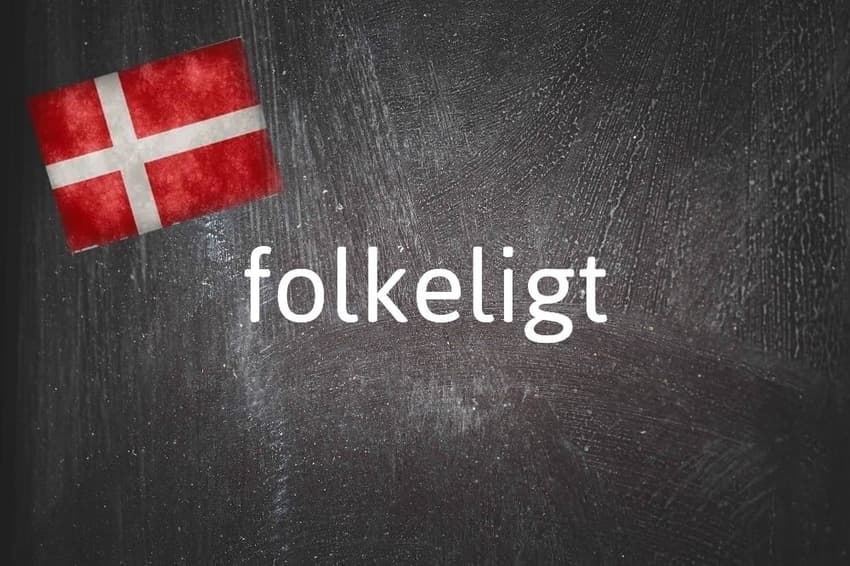Danish word of the day: Folkeligt

Photo by Francesco Ungaro on Unsplash and Nicolas Raymond/FlickR
Today’s Danish word of the day is of the people and for the people.
What is folkeligt?
Folk means “people” and can have various nuances related to context just like “folk” and “people” in English.
It can mean “a people” in the national sense or people joined by some sort of characteristic such as gamle folk (older people) or solhungrende folk (sun-thirsty people).
It might also used to talk about people in the abstract or to convey a general truth: i gamle dage gik folk i kirke hver søndag (“in the old days people went to church every Sunday”).
It is also used in many compound words: folkeparti, "people's party", which is used by three different Danish political parties; or indeed folkefest, a party or festival for the people. Folkekære, literally “dear to the people” means something closer to “national treasure”.
Sometimes it means 'the people': folket or det danske folk can be used to refer to the public in general.
The suffix -lig or -elig on the end of a word (these can both end with ‘t’ depending on grammatical construction) turns a noun into an adjective, and means to be closely related to or characteristic of something. Barnlig is “childish”, en grønlig farve means “a green-like colour” and endelig means “finally”.
Why do I need to know folkeligt?
To be folkelig is to be closely related to the people or the general public, but also to reflect the people or to have sprung from the people.
Music can be folkelig (without necessarily being folk music, although folk music would fit this description). Traditions can be folkelige as opposed to religiøse (religious), and culture can be folkelig, carrying the subtext that it is a product of the people and carries a simple but valued quality.
People – usually public people – are also sometimes described as folkelig. This means they are considered in some way to be close to the people or even one of them, even though their status or position in society in some way sets them apart from the masses.
To be described as folkelig, it is probably necessary to spend several years demonstrating a down-to-earth, approachable, and to a certain degree humble personality to gain public favour. Once a person has it, they may enjoy huge popularity and support in their endeavours.
Example
Der er en enorme folkelig opbakning til det nye kongepar.
There’s huge public support for the new king and queen.
Kongen er kendt for at være folkelig.
The king is considered a man of the people.
Comments
See Also
What is folkeligt?
Folk means “people” and can have various nuances related to context just like “folk” and “people” in English.
It can mean “a people” in the national sense or people joined by some sort of characteristic such as gamle folk (older people) or solhungrende folk (sun-thirsty people).
It might also used to talk about people in the abstract or to convey a general truth: i gamle dage gik folk i kirke hver søndag (“in the old days people went to church every Sunday”).
It is also used in many compound words: folkeparti, "people's party", which is used by three different Danish political parties; or indeed folkefest, a party or festival for the people. Folkekære, literally “dear to the people” means something closer to “national treasure”.
Sometimes it means 'the people': folket or det danske folk can be used to refer to the public in general.
The suffix -lig or -elig on the end of a word (these can both end with ‘t’ depending on grammatical construction) turns a noun into an adjective, and means to be closely related to or characteristic of something. Barnlig is “childish”, en grønlig farve means “a green-like colour” and endelig means “finally”.
Why do I need to know folkeligt?
To be folkelig is to be closely related to the people or the general public, but also to reflect the people or to have sprung from the people.
Music can be folkelig (without necessarily being folk music, although folk music would fit this description). Traditions can be folkelige as opposed to religiøse (religious), and culture can be folkelig, carrying the subtext that it is a product of the people and carries a simple but valued quality.
People – usually public people – are also sometimes described as folkelig. This means they are considered in some way to be close to the people or even one of them, even though their status or position in society in some way sets them apart from the masses.
To be described as folkelig, it is probably necessary to spend several years demonstrating a down-to-earth, approachable, and to a certain degree humble personality to gain public favour. Once a person has it, they may enjoy huge popularity and support in their endeavours.
Example
Der er en enorme folkelig opbakning til det nye kongepar.
There’s huge public support for the new king and queen.
Kongen er kendt for at være folkelig.
The king is considered a man of the people.
Join the conversation in our comments section below. Share your own views and experience and if you have a question or suggestion for our journalists then email us at [email protected].
Please keep comments civil, constructive and on topic – and make sure to read our terms of use before getting involved.
Please log in here to leave a comment.